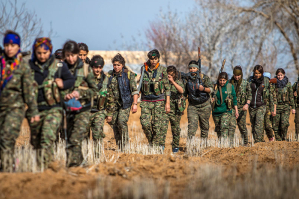
The terror group known as ISIS targeted a series of mainly Christian villages in northeastern Syria on Saturday. However, the militants were beaten back by Kurdish forces and their local allies.
According to a report from the Associated Press, the fight focused in villages along the northern bank of the Khabur River in Hassakeh province. Osama Edwards, director of the Assyrian Network for Human Rights, told the Associated Press that ISIS attempted to capture the key city of Tal Tamr, located 35 km from the city of Hassakeh.
"The battles are now very intensive, very violent" Edwards said. "Tal Tamr is the main goal of the Islamic State, to give them the corridor to the eastern border to Iraq."
The Associated Press reported that ISIS kidnapped more than 220 Assyrian Christians from that same area last month, when the terror group managed to overrun some farming communities on the southern side of the river.
Sam Dagher of the Wall Street Journal reported that Christians and other minorities in northeastern Syria are caught between the Kurds and ISIS. Many of them, including 55-year-old Assyrian Christian engineer who goes by the nickname Abu Rami for security reasons, either joined the Kurds in the fight or departed from the region altogether.
"We are being trampled on by the warring sides," Rami said. "We feel we are being pulled from our roots."
According to Dagher, ISIS started attacking Christians in the area on Feb. 23 in retaliation for recent setbacks on the battlefield. Raidor Khalil, a spokesman for the Syrian Kurdish militia People's Protection Units, or YPG, reinforced that notion.
"For sure it's connected," Khalil said.
The Wall Street Journal reported that YPG, in conjunction with help from the international coalition led by the United States, held back ISIS from the strategic northeastern Syrian town of Tal Hamees near the Iraq border. The group also successfully kept out ISIS militants in the border town of Kobani, although that effort took over four months.
"The U.S.-led coalition played a major and vital role in the capture of Tal Hamees and Tal Brak," Khalil said. "There was a high level of coordination."
According to Dagmar, the villages targeted by ISIS were mostly inhabited by Assyrians, who were the descendants of one of the Middle East's principal civilizations who later converted to Christianity. Before ISIS attacked them, they had an uneasy relationship with the terror group.
"The deal was that Christians would be left alone as long as they didn't support the Kurds, according to Hasakah residents," Dagher wrote.
However, after ISIS was defeated in Kobani, the Wall Street Journal reported that ISIS started making demands on the local Christian population, which included removing crucifixes from churches and tombstones.
"Church leaders complied and negotiations were also under way with Islamic State for these villages to pay a tribute tax paid by non-Muslims," Dagher wrote.
According to the Wall Street Journal, Elizabeth Gawria, a Christian and senior official in the Kurdish-dominated area of Syria, appealed to both the U.S. and Europe for more military and political support.
"Help us to remain in our land, strengthen us," Gawria said in her appeal.






